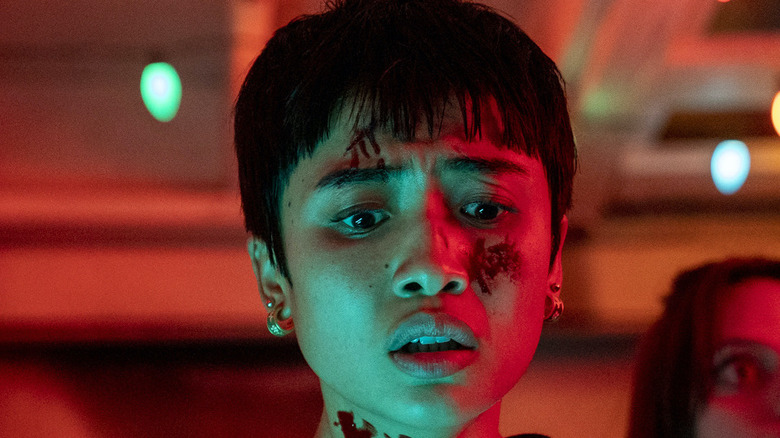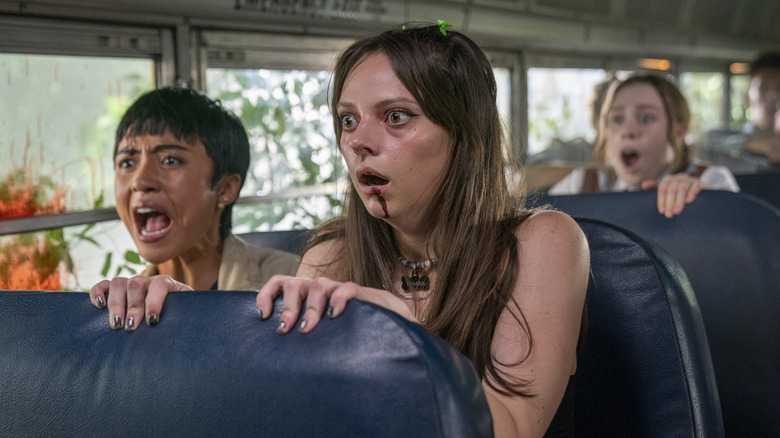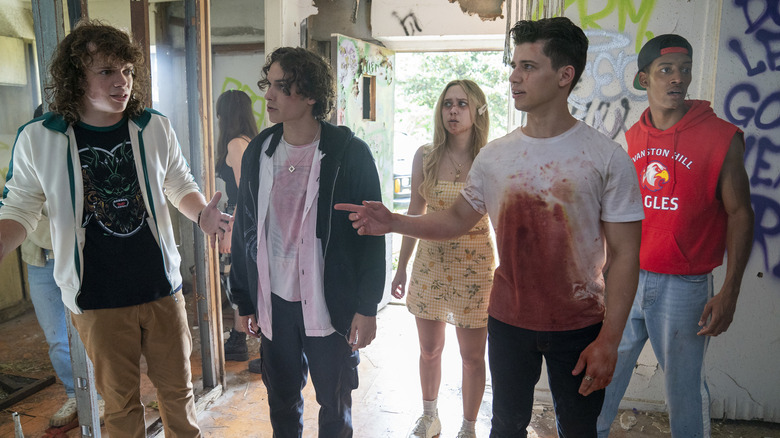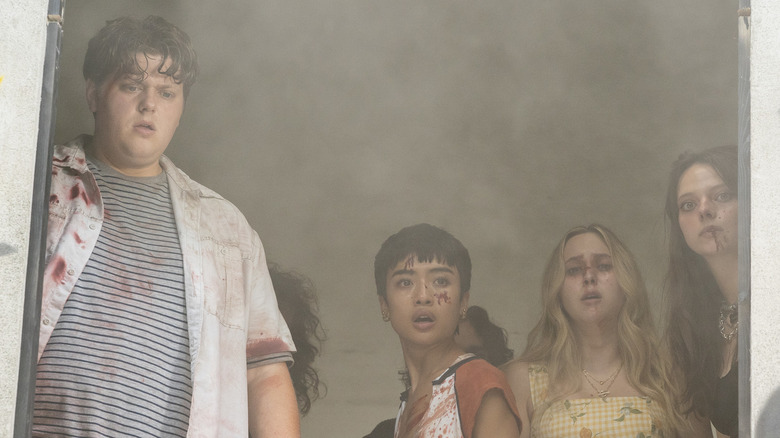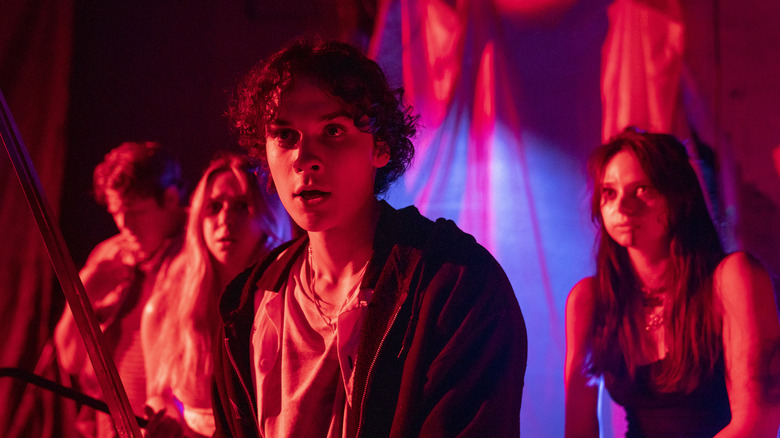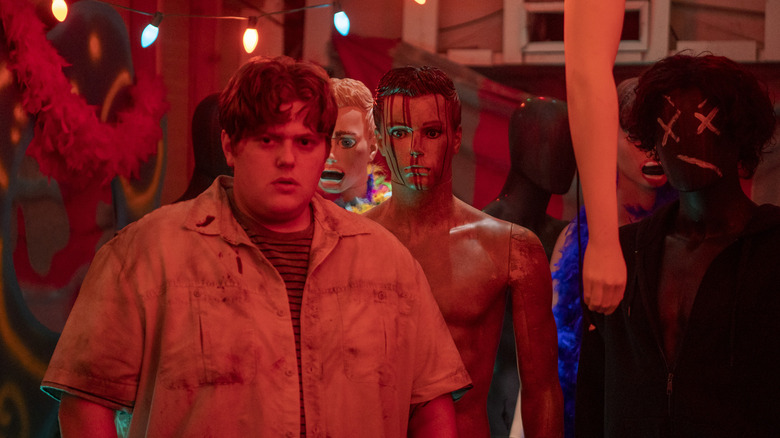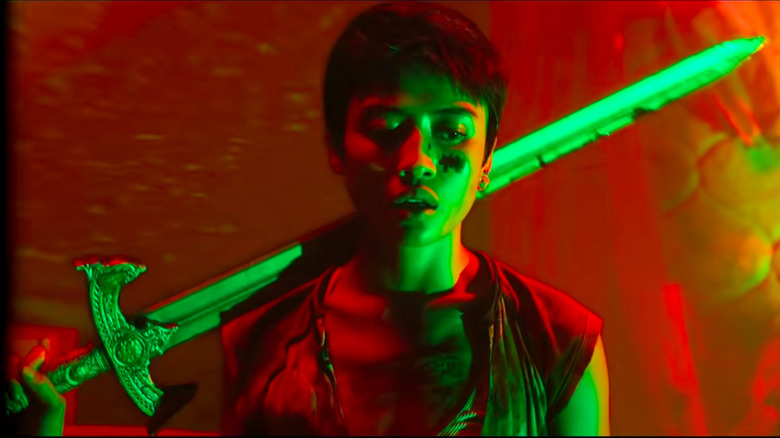Marcus Dunstan Talks Mining The Horrors Of High School For Unhuman - Exclusive Interview
High school can be hell, and for a group of students on an ill-fated field trip in the upcoming movie "Unhuman," that statement becomes literal when their bus crashes and they're attacked by a very angry, very determined zombie. Yet, even as the teens fight for their lives, they never completely leave behind the hierarchies of high school or the uncertainties of growing up, which leaves them battling everything from their preconceptions of one another to their own insecurities along with the undead. It's a "Blumhouse Afterschool Special" that hits all the bloody horror notes while also packing in plenty of humor and meaningful themes about coming-of-age that both teens and adults will relate to.
Bringing it all together is the director of "Unhuman," Marcus Dunstan, who also co-wrote the script with his writing partner Patrick Melton. Dunstan and Melton's big break came when their horror script "Feast" won the third season of the Hollywood reality competition series "Project Greenlight," and the pair soon established themselves as the go-to writers for all things horror, penning everything from the final three films in the "Saw" franchise to the horror comedy sequel "Piranha 3DD." Along the way, Dunstan made his directorial debut with "The Collector," an endeavor that led to a second career helming terrifying treats like "The Neighbor" and "Pilgrim," the feature-length Thanksgiving installment of Hulu's "Into the Dark" horror anthology. Now with "Unhuman," Dunstan has made a movie that puts a clever spin on the terrors and triumphs of the teenage experience.
Looper sat down with Dunstan to exclusively talk about his latest fright-filled film, including what he wanted to add to the zombie genre with "Unhuman," what the movie says about high school bullies, and why he enjoys writing and directing horror films.
Adding a human element to the zombie genre
The zombie genre has been especially popular in the past few years with "The Walking Dead" and "Army of the Dead." What did you want to add to it with "Unhuman"?
We wanted to add a human. To take advantage of the title, we wanted to add this human part to the unhuman experience — in this case, the zombies are a bit of a reflection of emotions run amuck, too. There's a cunning, there's a wickedness, they're mean. They are looking to almost tear away confidence, appearance, all the pillars of high school that are lined up that we're supposed to be striving for. "Does he or she, or they, like me? Am I going to be accepted? Am I going to be exalted? Is this my day of victory? Is this my day of defeat?" All those intense feelings that are within us always somewhere closer to boil than simmer get to be thrown into this stew. Once that catalyst comes in, the irrational angry force, there's the storm.
That's what I wanted to do. What I loved about "The Living Dead" movies [is that the zombies are] not just opponents, they're not just mass. They are a reflection of something. They are a soil with which the theme grows. We wanted to also tackle bullying and the ultimate irrational force bully is out there. And it's spreading, like bullying can spread if you do nothing. Within all these people, they got to find the hero, they have to acknowledge their potential to be a victim, and if they respect each other, come together, maybe they have a chance to put this down for good. Maybe, but you know, high school. [Laughs]
What did you want to say about the high school experience and the consequences of bullying with the film?
Ultimately, I wanted to put my arms around the experience and leave things that haunted me there. I asked that of every cast member and crew as well, like, "If something comes to mind, let's say we scratch the surface of a moment. Please share it. Let's put it in." And by God we did. It could be someone working with lights, camera, or whatnot. There was this, "Let's use this opportunity to be a bit of a time machine. Does something still hurt? Does something still haunt you? Let's face it and leave it there." By doing so, maybe we're going to help somebody get through a vulnerable, harrowing moment in their formation.
Exploring the characters' pain, even the villains
The movie includes several toxic male characters. Some are very obvious from the beginning, others much less so. What were you trying to comment on there?
Often, I like a horror movie's architecture, when the typical victim is the most engaging character in a way. They are forthright. They are, "Here's who I am." By and large, they're the most interesting person. You can hate them, which I consider interesting. You can love them, I [also] consider that interesting. Or maybe they're an extension of what you wish you could do every day in public, because this character says it, does it, doesn't care about the ramifications. But the horror movie's always like, "This is our playground."
I wanted to give that 15 minutes or so of ... remember those seminal romantic comedies and teenage comedies that are now being re-reviewed for, in some cases, having some absolutely appalling morals stuck in there? Remember the movies that were considered appalling that actually had the scared straight program modus operandi, like "Friday the 13th." Hey, if you're a jerk, you're dead. If you do drugs, you're dead. If you cheat on someone, you're dead.
The romantic comedies and the teen movies were like, "Guess what? Let's get trashed and harass the geek." I wanted to take that, use all of it, use every aspect of it. Take the toxic male, and even the toxic anybody, including our toxic villains, and cleave them like an onion and say there's still even more to that person too, because once you get into it, I wonder if their kettle whistle isn't pain, pain that maybe got to them a little earlier. Then they processed it and were like, "The only way I understand this is I can laugh if I'm laughing at someone else's pain. I got to laugh at my own or I'll fall apart."
I had a conversation with Uriah [Shelton, who plays Danny] that I absolutely cherished, and it all kind of started where we were trying to come up with a tone real quick. The idea was a bully is really a comedian with a very limited audience. [Laughs] All of a sudden, you'd see his shoulders change, his jaw went up and he was like, "There it is. They're blissfully unaware. As long as I hear enough laughter, that's all I need."
A character who's also 'the camera of the movie'
The main character, Ever, is struggling with a lot of insecurities. Why did you feel that was the character that should be your hero?
Ever is quizzical, Ever is observing, and I thought like, "All right, Brianne [Tju, who plays Ever], you are playing the camera of the movie." This whole film, there's almost a secret production, be it what's happening in speakers and whatnot, and you're the camera. When you have to reflect on people, you're seeing it through a lens that's a bit more omnipresent, because, yes, you may think you're in the midst of fighting the edges of your soul and how your corporal form is going to become an adult and what your identity will be, but you're also the only one that's taking in all the options in a way. Who are you going to be reflection of? If I'm friends with this person, am I that? If I'm alone, am I nothing? That became an absolute wonderful catalyst for a character that takes the horror movie to actually help it happen. Not unlike "Deadpool" being triggered by absolute pain, agony, and whatnot, and then this hero emerges.
In this case, you can observe. And hopefully you've done all the learning you can in this scenario, but now here comes something that no one [thought] could ever happen. What's that going to do to your character? Who are you going to become? She doesn't become a version of anybody else, she becomes an absolute version of herself. Will it be enough to survive? Will it be enough to save? You've got to watch to find that out. But when you have Brianne, we knew we can push this so much further, and I think we hit the half-court shot because we saw that person in there. I was Ever, I was also Drew [Sheid's character Steven]. There was a moment of everything in there that had to come from someone who worked on this movie's actual life. Somebody had to give something that we could donate to this experience, so it maybe hit you a little more in an unexpected, but really heartrending, way.
Getting viewers' attention with a 'bold' and 'colorful' visual style
The movie has this really anarchic visual style, with a lot of neon, exaggerated lighting, and the interesting way you divided up the screen at different points. How did you develop the visuals for the film?
I am very fortunate to work with Lyn Moncrief, Director of Photography. We collaborated on "Pilgrim." The other head of this particular hydra is Andrew Wesman [who] is not only a brilliant storyteller, but he's been an editor that I've worked with on four [or] five projects. We had a shared arsenal, not only of experience, but of attempts and ways where we've been auditioning this ... for years in how to maybe come up with the right opportunity to use the full package.
What I mean by that more directly is this movie was saying, "We're a Blumhouse Afterschool Special, we can be more bold." We've got an ensemble cast, we can be more colorful. We have this amount of running time, we better hit our marks early. And we've got one hell of a twist, so we've got to get a lot of movie done before that lands and starts to change the architecture. If we've seen any type of scene like this, or even elements of scenes like this, why are we different? Why are we going to keep the eyes going when you can turn, watch, and be distracted by anything else out there? Well, then we're going to punch with color. We're going to be more aggressive. We're going to do what the PTA so desperately is always trying to do: Get the attention of these people. Get the attention of these wild, irascible souls in the formation of their lives, to try to teach them, to try to say, "We love you. It's going to be okay. Listen to us."
That was the gateway to almost have a bit of creative permission to do so, but then none of that happens unless you've got the trust, and you've been given that ability by a doggone studio, and a budget, and a crew. That goes all the way back to Blumhouse. Without that, none of this happens. I can't believe we're the only people that had some of these ideas before, but it took a long time to get the trust and the resources, and then, most ultimately, the cast. Ever could have been, and Brianne could have been, in any environment and made it special, but the fact that, with her talent and her ability to create this galvanizing force at the center of it, the environment doesn't overpower her performance. You're always still with the epicenter in this. She's the soul and the camera.
The hidden family connection in 'Unhuman'
A mid-credits sequence seems to point to a potential sequel. Are you planning to write and maybe direct more "Unhuman" movies?
In this case, [the mid-credits scene] was a hug to my mom. She was the first woman who was a principal in our district, [she was] always in education. When I was in high school, she was one of the counselors. She taught me how to paint. She's always been teaching. Far too often, even in the seminal comedies [and] movies of high school, the teachers are sometimes fodder, sometimes ridiculous, sometimes out of touch. My mom never was.
I wanted my dear, dear friend, ally, ride or die, [actor] Emma Fitzpatrick to show up as a character, she's essentially [playing] my mom and hit it out of the park. My actual mom is in the movie too as the principal standing next to my fifth grade teacher, Carol Clean, and my dad who's leading the band.[Laughs] That was awesome.
The continuing pull of the horror genre
You've written and directed a long list of horror movies. What keeps you coming back to the genre?
I keep having something to say. What was interesting is when you start out, you're hoping your voice finds an ear or something. You're hoping that all the years of focused watching in a basement of the horror movies may come back to serve in some way. I think to tie it back to my parents, the educators, there's still a way to teach. Maybe someone gets through this movie and they don't want to be a bully. Or maybe someone gets through this movie and they're like, "Well, the next time I'm bullied, I know it doesn't have to be violence. It doesn't have to be this." Sometimes it's empathy. Sometimes it is straightening somebody out. But it's going to take us all to get through it.
"Unhuman" is currently available on digital platforms.
This interview was edited for clarity.
